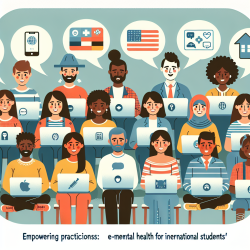Introduction
The COVID-19 pandemic has reshaped many aspects of our lives, including how we work, socialize, and access services like therapy. A recent study titled "Mobile device location data reveal human mobility response to state-level stay-at-home orders during the COVID-19 pandemic in the USA" offers valuable insights into human mobility patterns during the pandemic. These insights can be instrumental for practitioners, especially those in online therapy services, to enhance their skills and adapt to the changing landscape.
Understanding Human Mobility During COVID-19
The study utilized anonymized mobile device location data from over 150 million monthly active samples in the USA to analyze mobility changes during the pandemic. It identified three key metrics: daily average number of trips per person, daily average person-miles traveled, and daily percentage of residents staying at home. The findings revealed a spontaneous reduction in mobility that occurred even before government-mandated stay-at-home orders were issued. This spontaneous change highlights the public's proactive response to the pandemic, which can be a crucial consideration for therapists working remotely.
Implications for Online Therapy Practitioners
For online therapy practitioners, understanding these mobility trends can enhance service delivery and client engagement. Here are a few strategies that can be derived from the study's findings:
- Adaptability: Recognize that clients may have already adjusted their routines in response to the pandemic. Tailor therapy sessions to accommodate these new routines, potentially offering more flexible scheduling or asynchronous communication options.
- Client Engagement: Use insights from mobility data to anticipate changes in client availability and engagement. For instance, if clients are traveling less, they may have more time for therapy sessions, but they might also face increased stress from reduced social interactions.
- Resource Allocation: With the reduction in mobility, clients may require additional resources or support to manage their mental health. Practitioners can provide targeted resources or interventions that address the unique challenges posed by the pandemic.
- Technology Utilization: Leverage technology to maintain continuity of care. The use of secure online platforms for therapy sessions can ensure that clients receive consistent support, even if their mobility is restricted.
Encouraging Further Research
The study underscores the importance of data-driven approaches in understanding human behavior during unprecedented times. Online therapy practitioners are encouraged to engage in further research to explore how mobility data can inform therapy practices. By staying informed about the latest research and trends, practitioners can continue to provide effective and responsive care to their clients.
Conclusion
The insights from the study on human mobility during COVID-19 provide a valuable framework for online therapy practitioners to enhance their skills and adapt to the evolving needs of their clients. By leveraging these insights, practitioners can improve client engagement, tailor their services, and ensure legal compliance in their practice.
To read the original research paper, please follow this link: Mobile device location data reveal human mobility response to state-level stay-at-home orders during the COVID-19 pandemic in the USA.










